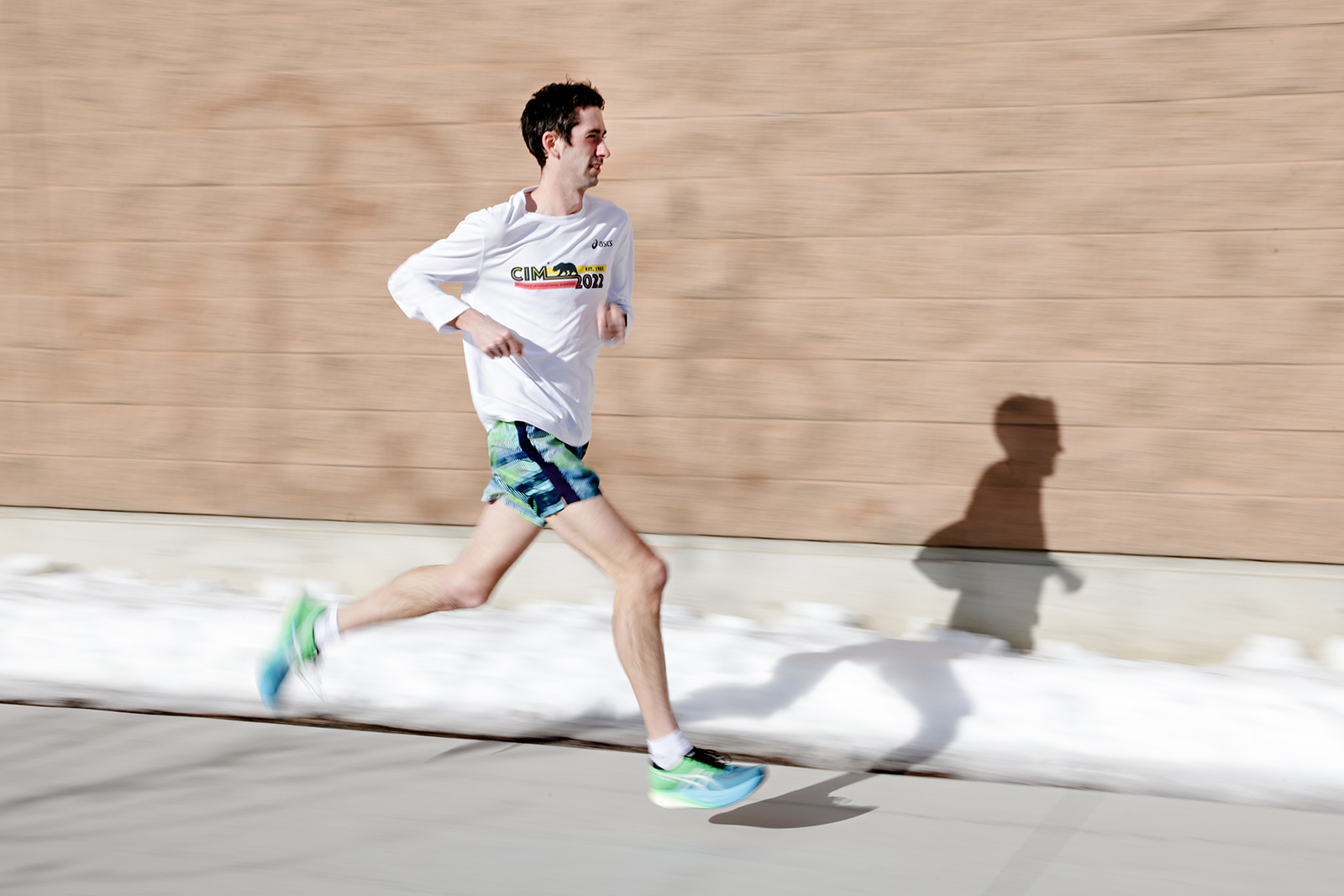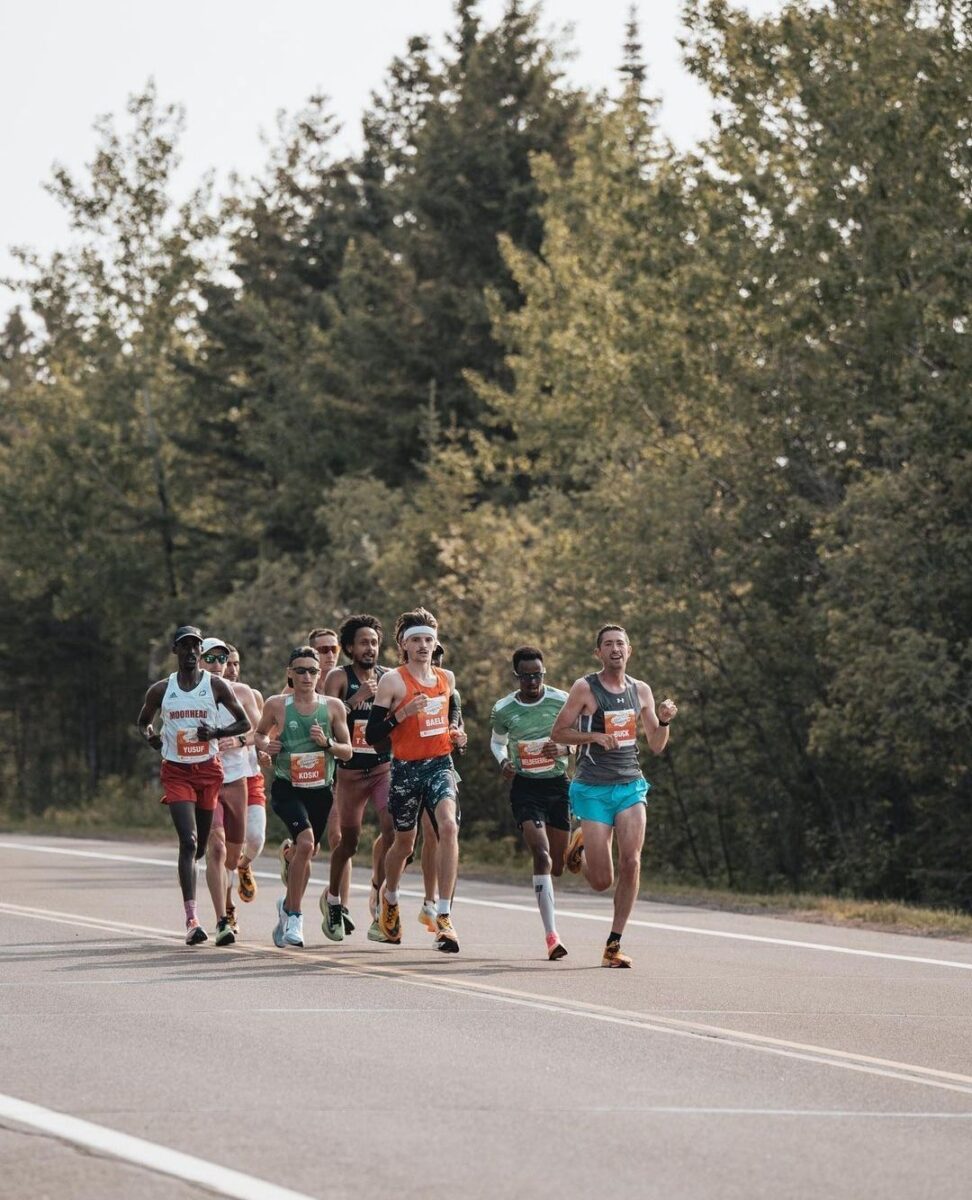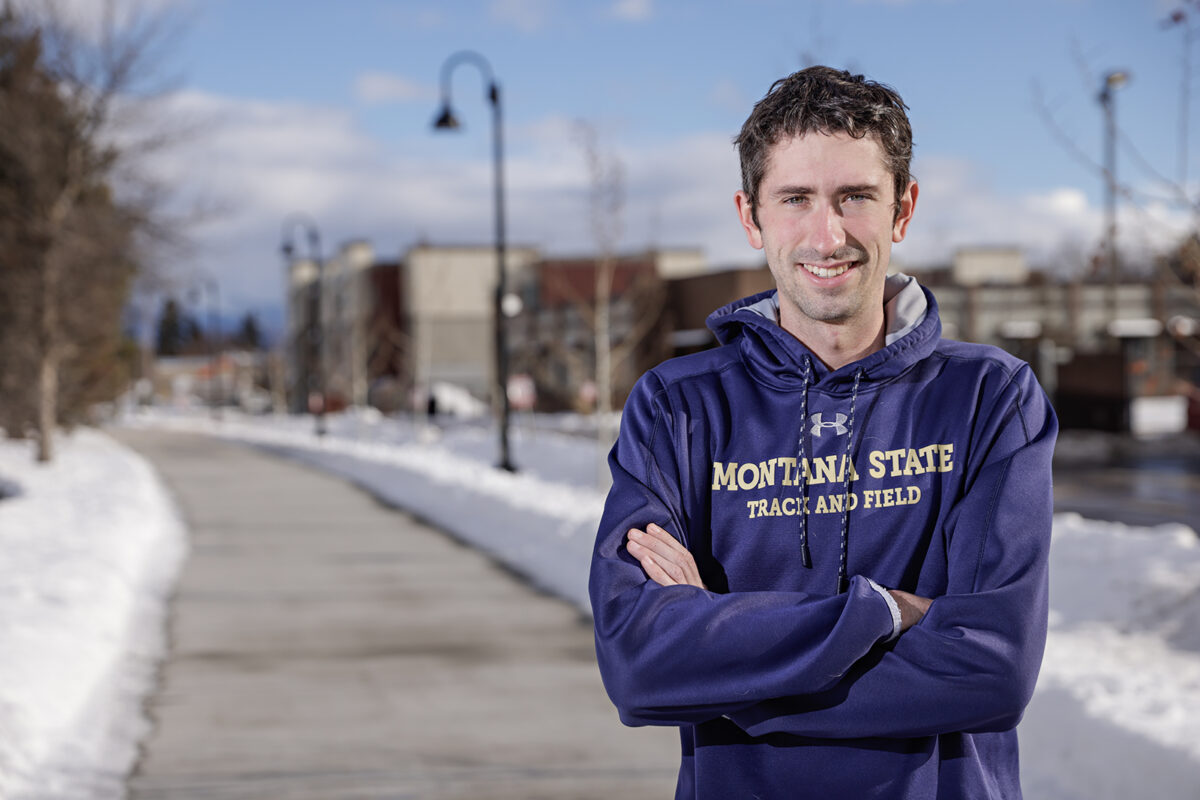The Buck Doesn’t Stop Here
Flathead Valley running phenom and Olympic Marathon Trials hopeful Collin Buck has positioned himself as an unstoppable force as he heads to the nation’s most competitive proving ground
By Micah Drew
On a Sunday morning in November of 2022, Kalispell resident Collin Buck ran around Whitefish in the pre-dawn darkness. With a few weeks to go before his first marathon, Buck was doing a workout designed to roughly simulate what the 26.2-mile race would feel like. It was a grueling prescription of 5-kilometer repeats — fivetotal — made more difficult by a constant wind and below-freezing temperatures.
Buck pushed through the conditions long after his three companions pulled the plug on their own workouts. He averaged 5:23-minute-per-mile pace per interval, just a hair over 16-minutes for each 5k.
Three weeks later Buck toed the line at the California International Marathon in Sacramento with 9,000 fellow runners. Despite some hiccups to the trip, including a delayed flight that meant he didn’t reach his hotel until 10 hours before the race began, he had a solid performance.
His finish time of 2:19:24 was an average of 5:19 per mile — faster than his windy workout in Whitefish.
“Went out a bit fast and blew up at the end,” he wrote in his training log after the race. “First marathon and I learned quite a bit from it.”
Fast forward 14 months, and Buck is headed to Orlando, Fla., to run his third marathon at the U.S. Olympic Trials, where the top three runners (assuming they all meet specific criteria) will represent the country at the Summer Olympics in Paris.
If you hang around road runners and marathoners for any length of time — often less than a pint’s worth of discussion will do — there’s a good chance someone will throw out the term “BQ,” or Boston Qualifier. Running in the nation’s most prestigious marathon is a gold star achievement for many runners, made more appealing by the rigorous time standards required to gain entry.
But for a rarefied group of runners, those in the grey area between recreationally competitive and professional, another North Star guides their goal-making — the Olympic Trials Marathon.
While other running disciplines, like those contested on the track, are limited to small fields of qualified athletes who compete for the Olympic team, the format of the marathon naturally allows for a much larger event that includes many elite, but not professional, runners.
During each four-year Olympic cycle, USATF, the national governing body for track and field and road running, establishes standards to qualify for the Olympic Trials in all disciplines. The Olympic Trials Qualifier (OTQ) in 2012, 2016 and 2020 was set at 2:19:00 for men, and lowered to 2:18:00 for the 2024 cycle, with 228 men earning their OTQ. One hundred and seventy-three women also qualified with a time of 2:37:00 or faster.
Buck, 25, is one of three resident Montanans who earned a trip to Orlando, along with Bozeman-based Adam Wollant, and former Bigfork resident Makena Morley, who has since announced she will not be competing in the Trials due to a lingering injury.
Most of those qualifiers do not expect to vie seriously for the Olympic team but have nevertheless reached a pinnacle career moment by earning the privilege of toeing the start line with their peers.
“My goal is to just go out and attach to the top group of runners early on,” Buck said during an interview in Kalispell 10 days out from the Trials. “I’m assuming very few of them will know anything about me, but I want to be out there with them, run as smart as possible, and see what happens.”

“It’s shocking to me, because I didn’t have that goal even a few months ago,” said Buck, who earned his OTQ last summer at Grandma’s Marathon in Duluth, Minn. “I was not targeting anything like that last year, because I really didn’t think I was even going to get the qualification at Grandma’s. I didn’t have any workouts that really indicated I was ready to run that time and I had a lot going on in life.”
It’s a lofty goal. Buck isn’t listed in the Trials media guide as an “athlete to watch.” His qualifying time is 111th on the descending order list and his name is misspelled on the Trials website. Even so, it’s a measure of success his younger self never imagined.
Buck grew up in Great Falls and ran track and cross country for Charles M. Russell High School. He was good by high school standards, but not a track star by any means.
“It’s funny because when Collin was in high school, I was coaching against him,” Flathead High School cross country coach Jesse Rumsey said. “I was coaching Jake Perrin who won several state titles, and really, no one knew who Collin Buck was.”
The only time Buck landed on a podium, during his senior track season, the announcercalled out the wrong name. “They assumed the fastest CMR runner was my teammate,” he recalled.
Athletic directors weren’t dangling any flashy athletic scholarship in front of Buck when he graduated high school, so he decided to remain in-state for college, matriculating to Montana State University to earn an education degree. However, he had seen just enough improvement during his senior year of high school that he decided to keep training.
“Every time I’ve thought I’m going to be done with running, I feel like I always see just enough results to tell myself, ‘Oh man, I can’t stop doing this,’” he said.
After a year of training solo and competing in road races, Buck had the chance to try out for a spot on MSU’s cross country team. He made it, barely edging out another prospective Bobcat in a race.
As a collegian, Buck quickly learned he had a knack for longer-distance races and could handle a high volume of training with impressive results.
“I remember going out during winter break and running 110-, 115-mile weeks and then came back and we did a mile race-pace workout. And I crushed it,” Buck said. “My coach said he’s never met anyone who could translate miles into speed as much as I could. And it just keeps working for me.”
Buck finished college with lifetime bests of 13:57.90 in the 5k and 28:58.39 in the 10k — solid performances but not quite professional grade.
Again, he considered leaving the competitive scene. He took several months off from running as he transitioned into a career and moved to Kalispell for a teaching position at Flathead High School.
In addition to teaching sports medicine and Earth science, Buck began working with Rumsey as an assistant cross country coach.
“Coaching is something that helps me in terms of motivation,” Buck said. “I think seeing kids push themselves and seeing them work so hard, it’s really a two-way street. Obviously, I’m there to help them, but when you see them going out and challenging themselves every day, it’s extra motivation for me to go out and do that myself.”
Buck is easy to spot at high school meets, sprinting back and forth around the cross country course faster than all spectators, coaches and most athletes. Wearing his trademark blue-and-teal shorts and a Braves shirt, Buck makes sure each of his runners see and hear him cheering them on multiple times during their races. It’s not uncommon for him to cover six or seven miles during a single meet of coaching.
“Collin came to us with such a wealth of knowledge and the kids really look up to him,” Rumsey said. “He’s been so successful as a runner, and he’s really open to sharing those insights and experiences. He can talk about how a good career comes with bad workouts and bad races — even bad seasons — and they listen to that.”
Having an elite-level coach jump into their workouts boosts the kids’ performance, Rumsey said, and Buck is always willing to run with anyone on the Braves team — not just the top varsity runners.
“He’ll work to meet every kid he’s coaching,” she said. “It’s also cool because Collin wasn’t a state champion in high school. But he’s had a huge trajectory to where he is now, and that gives a lot of our athletes good hope for what they can achieve.”
Once Buck started training for the marathon, he had to learn a new way to balance running with the rest of life. Compared to college, where athletes can focus much of their day around training for a specific sport, Buck began getting out of bed at 4:30 a.m. every day to get his first run in before school started. A second run would usually take place with the cross country team after school. Recovery and sleep took precedence over social outings in the evenings and on weekends.
“There’s definitely some sacrifices we make together, but I love supporting him,” Buck’s fiancé, Sam Kelderman, who also ran for MSU, said. “I understand what it takes to compete at a high level and the sacrifices are definitely worth it.”
When Buck made it to the starting line of his second marathon last summer, he wasn’t sure how it would go. His training hadn’t been ideal, and he’d lost his teaching job at Flathead. In Duluth he dug deep and crossed the finish line with nearly a minute to spare.
“I called him immediately when I saw he’d finished and he was ecstatic,” Kelderman said. “Collin’s not a really emotional guy but he didn’t think he was going to make it. He gained so much confidence in himself and his ability to perform on the day that matters.”

The No. 1 ranked marathoner in the country right now is 27-year-old Conner Mantz of Provo, Utah. The two-time NCAA cross country champion from Brigham Young University turned professional after college and has earned two national titles and a top-10 finish at last year’s Chicago Marathon in a blistering 2:07:47.
In mid-January, a video of Mantz and two of his Provo-based training partners depicted one of his final tune-up workouts. In below-freezing temperatures at an altitude of 4,551 feet, Mantz ran four intervals of three miles.
With a 3.5-minute rest between each interval, Mantz averaged 4:45 per mile for the first three intervals, dropping to 4:34 for the final repeat, the equivalent of a 14:13 5k time.
That workout is conveniently similar to the 5x5k workout that Buck has deployed in his previous marathon buildups, so while the Flathead Valley was laboring beneath an Arctic freeze, he hopped on the treadmill and set out to test himself against one of the best.
“I’ve done all the conversions over and over,” Buck said. “He was in cooler weather, I was on a treadmill at a lower altitude, but I was solo, and I did a whole extra rep. But I was still averaging 40 seconds faster than I’ve done on this workout before.”
Buck matched Mantz split-for-split, even running a few seconds faster on his final repeat.
“I was watching him do that treadmill workout and I literally had chills,” said Kelderman, who will be in Orlando to watch the Trials. “It was absolutely insane.”
“Collin’s very calm, he’s so even keeled about everything and super logical. He just puts his head down, works hard, gets his training done and executes,” Kelderman added. “He’s always had the mindset of ‘this is what I can achieve based on the work I’ve put in.’ With what he’s done this time, I’m kind of freaking out.”
One standalone workout doesn’t prove anything, but Buck has had the best training cycle of his career. Working a remote teaching job has allowed him to focus more on getting adequate sleep and adhering to recovery routines. Since September he’s strung together 16 consecutive weeks running more than 100 miles — peaking at 130. He has more than 2,000 total training miles on his legs, all geared toward Feb. 3.
“Certainly, I feel like if I do really well in the Trials, it will feel justifying that I devoted the extra time,” Buck said. “It justifies when I made that decision to work fewer hours and take those hours and put them back into training and recovering. It’s a gamble, and it’ll be unbelievably satisfying if it works out really well.”
What does doing “really well” entail?
“I mean, if I made it anywhere in that top-10 group, that would be something I’d say is doing really well. Past that, it’s kind of a luck thing of who shows up on that particular day, and who has a good race,” Buck said, acknowledging that anything can happen over 26 miles of racing. “If I did make that top three, well, I’d be phenomenally excited.”
The 2024 Olympic Trials Marathon start at 10:10 a.m. EST on Feb. 3. The event will stream live on Peacock and broadcast on a delay on NBC starting at 12 p.m. EST.
